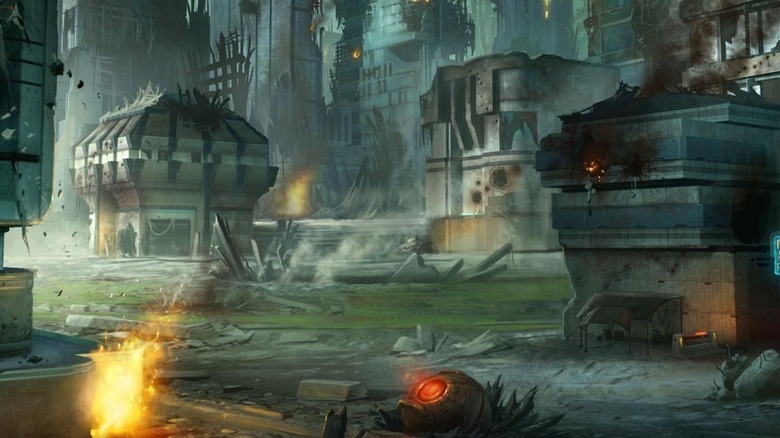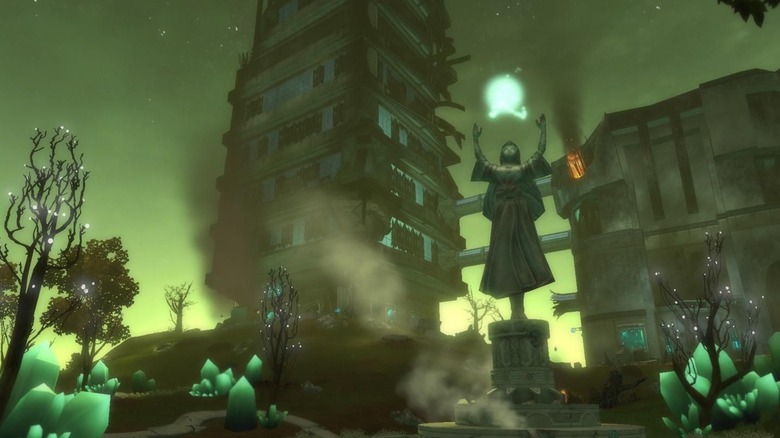The Canceled Stargate Video Game Could Have Been A Classic
What makes a massively multiplayer online role-playing game (MMORPG) stand out? For starters, it facilitates a dynamic sandbox environment for genres that require intricate world-building (such as fantasy or sci-fi), while bringing social interaction to the forefront. While standard multiplayer games have a limited scope of player-to-player interaction, MMORPGs can accommodate a gigantic playerbase, who need to interact with the in-game world at all times to progress. There's a reason why genre staples like "World of Warcraft" or "Final Fantasy XIV Online" continue to attract new players despite sparking controversy. These online spaces also foster positive community bonding and offer a sense of comfort via their inherent longevity.
The "Stargate" franchise has enjoyed an exceptionally successful run since Roland Emmerich's eponymous 1994 film came out, but things regrettably came to an end with 2011's two-season "Stargate Universe." If you were to ask the existing fanbase about a potential revival, the answer would most likely be an enthusiastic 'yes,' as "Stargate" has always evoked fond nostalgia. Although the franchise has gifted us exciting lore and complex characters over the course of 17 years, things could've lasted a bit longer with the help of a tie-in game. I'm talking about "Stargate Worlds," the ambitious MMORPG that was cancelled after being stuck in the developmental phase for a bit too long.
The unique selling point of "Stargate Worlds" didn't rest solely in its ability to attract new audiences or cultivate a multimedia community. The game was supposed to flesh out franchise worldbuilding like never before, and answer pertinent questions about "Stargate SG-1" by filling in the blanks. With "SG-1" co-creator Brad Wright acting as creative consultant during the game's development, there were no doubts about the enormous potential of something so promising. Unfortunately, "Stargate Worlds" was never meant to be.
The Stargate MMORPG had everything going for it until its abrupt cancellation
The cancellation of "Stargate Worlds" is something of a festered wound for most "Stargate" enthusiasts, as the game was supposed to incorporate a mission-guided story alongside its MMO and open sandbox elements. Some of the earliest concept art corroborates this intent: we see snippets of a vibrant, diverse world along with striking character models that improve our understanding of various factions. The basic premise of the "Stargate" franchise was also a perfect fit for the open sandbox model, as players could travel through the titular Stargates to visit various planets, promising a genuinely massive online world rife with possibilities.
However, it is one thing to pitch an impressive idea for an ambitious project and another to pull it off from a practical standpoint. The Great Recession of 2007 (which lasted up until mid-2009) exacerbated delays, leading developers Cheyenne Mountain Entertainment (CME) towards a messy financial situation that mostly relied on investor money. Although those involved with the game were working day in and day out to bring it to life, this sudden financial crunch slowed down progress considerably.
By the time 2009 rolled around, the demise of "Stargate Worlds" had become inevitable, with CME fixing their attention on the less ambitious third-person shooter "Stargate Resistance." This is what the senior content designer for "Stargate Worlds," Steve Garvin, had to say about its cancellation in 2010 (via The Companion):
"We didn't have a lot of warning. We just closed [...] We had storylines you could compete in and quests you could do — from the story side, we had it tight. They were not honed crisp, but we had stuff that you could do, combat, and a PvP environment. We were probably four to five months from beta when it went to sh**."
But wait, that's not all. Right before the game's cancellation, CME filed for bankruptcy due to alleged unlawful dealings by former CEO Gary Whiting, which effectively hammered the final nail in the coffin with respect to "Stargate Worlds."
Stargate Worlds' intended gameplay was as intricate as its existing lore
As "Stargate SG-1" is majorly responsible for injecting the franchise with complex lore and memorable characters, the game was supposed to draw heavily from its ongoing plotlines. For instance, the Tau'ri and Goa'uld conflict would've been at the forefront, while Jaffa and Asgard were supposed to be playable races. In terms of broad classification, there were five races and two human factions, with classic "good" and "evil" morality (such as the Wraith being unspeakably evil!) guiding the respective objectives of these groups. In the interview linked above, Garvin also revealed that the System Lord Ra (who was the primary antagonist in Emmerich's "Stargate") would've made a comeback, prompting players to have distinct narrative/gameplay experiences depending on the faction they chose.
With constantly evolving lore defining the franchise, "Stargate Worlds" had to take a smart approach to its storytelling; an overly complicated story would've alienated newcomers. Even so, 16 worlds were decided upon during its developmental phase, and an intricate web of archetypes (which tied in to the combat style chosen by each player) was developed alongside the sprawling factions and races. In terms of locations, things were looking pretty great, as there was plenty to draw from "SG-1." The rest was a matter of the right creative input that aligned with the spirit of the 1994 movie and the show. Judging by CME's early concept art, these worldbuilding elements were coming together seamlessly to form a cohesive whole.
Alas, these earnest efforts did not bear fruit. I still believe that a similar "Stargate" MMORPG made today would be modestly popular if not explosively successful, but the mixed responses to the recent "Stargate: Timekeepers" (which, to be fair, is a real-time tactical experience) cast doubts on this hunch. Anyhow, making something as conceptually challenging as a massively multiplayer online game that highlights the most intriguing aspects of "Stargate" (while a;sp boasting innovation and longevity) is easier said than done. One can only hope that someone will eventually rise to the challenge.


